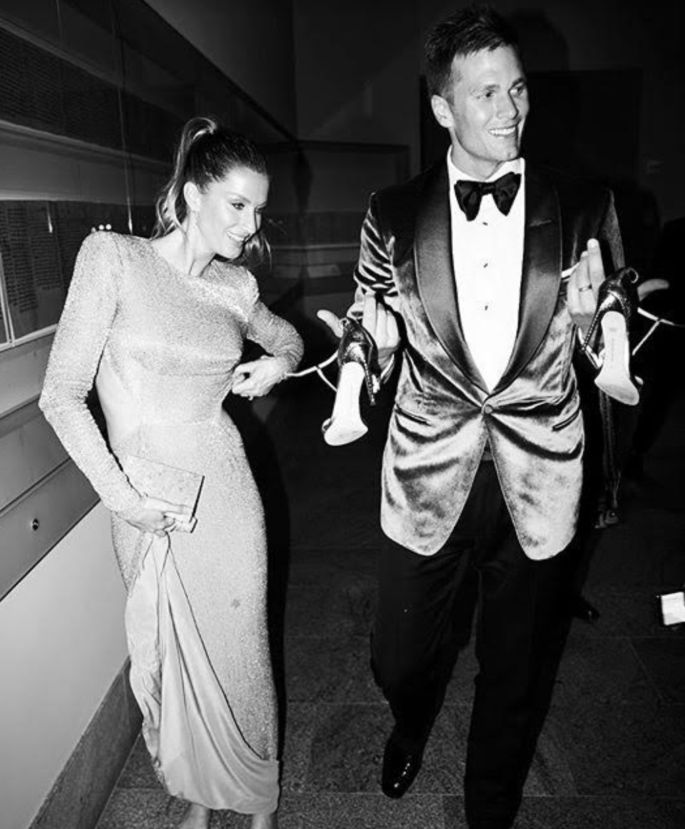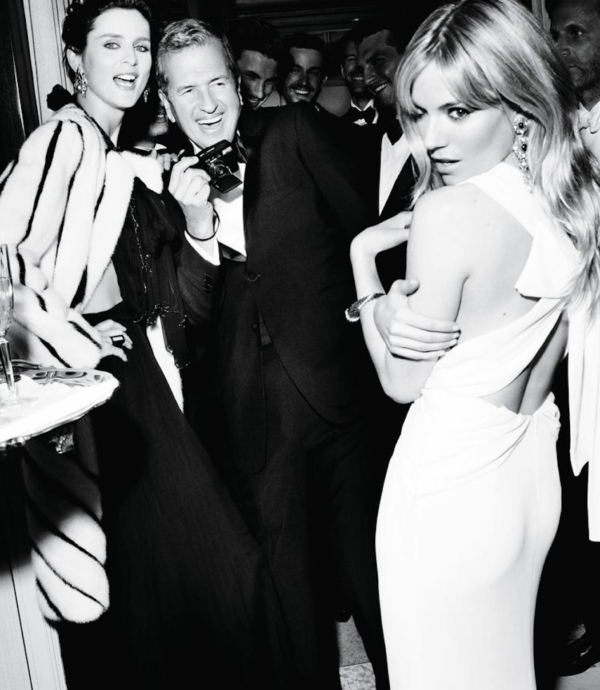Whether you love them or hate them, parties are important, says The New York Times. They are where people meet future business and romantic partners and friends, where small talk becomes the stuff of life. Who among us, save the most self-sufficient and confident partygoer (and who is that insufferable person, anyway?), wouldn’t like to party better? The Times recently published a guide that will teach you how to make seamless, beautiful small talk that leads to important conversations and connections. It will ease you into mingling effortlessly, and it will even demonstrate the right way to leave (without ruining your life). Go forth and party!
THE ARRIVAL
There are steps you can take to make arriving at a party less stressful and more fulfilling.
HAVE A PURPOSE
One of the issues with parties, unless you’re the most gregarious of extroverts, is that feeling when you’re about to walk into one but don’t know a single person there. Or perhaps you’re only vaguely connected to the host, who will surely be busy hosting. How do you start a conversation at a party with a complete stranger or someone you barely know? What if you do something horribly wrong, requiring you to sever all relationships and perhaps even move to an entirely new town or galaxy?
But there’s a reason you’re going to this thing. If there isn’t, you should think about not going.

Mario Testino for Vogue
“Say no if you want to say no, and save yourself the agony of cancelling,” said Morra Aarons-Mele, author of “Hiding in the Bathroom: An Introvert’s Roadmap to Getting Out There (When You’d Rather Stay Home).”
But let’s assume you do want to go, at least a little bit more than you don’t. Take a moment to identify, realistically, what your purpose is for going. Is it: To make a business connection? To meet a new friend? To relax? To have a good conversation?To taste some new food or wine? “If I’m going to a party where it’s more work than fun, I might prep for it differently,” Ms. Aarons-Mele said. “There’s no shame in that.” After you define your purpose, it becomes easier to set a goal for attending the party. Then you know what you want to accomplish before you have to leave.
Debra Fine, speaker and author of “The Fine Art of Small Talk,” likes to give herself a task at any party — for example, meeting three new people. “Once I do that, I can get a drink, I can leave,” Ms. Fine said. “You get to pick.” For Ms. Aarons-Mele, after she’s met her goal, “I’ll come home early, take a bath and enjoy alone time.”
Another tip: Give yourself a head start regarding potential conversations and mingling opportunities — and, ideally, quell nerves — by thinking about who else will be attending.
“Ask your friend who’s going to be there, review in your mind who might be there,” Ms. Fine said. Then you can come up with topics to start a conversation: Did someone recently get a new job? Have a baby? Share photos of a holiday on social media?
FIND YOUR ENSEMBLE
Party prep should involve what you wear. Pick a tried-and-true outfit — “whatever taps you into the best version of yourself, — as opposed to something that makes you feel self-conscious or that you’ll be constantly adjusting.
Some people like to choose a great top or jacket or necklace, like a talisman. That’s powerful, Or imagine “the person who would play you in a movie,” and dress like that for a boost of confidence.
WHAT TO BRING
The classic rule is to show up with something in hand. However, you don’t always need to show up with something for good friends. If you feel more comfortable arriving with a bottle of wine or a token of your appreciation, do that. If they say ‘just bring yourself,’ take them at their word. Or you can bring that fudge they love.
Remember that conversation is part of what you bring to any social event. Walk into a party with two to three things to talk about. These topics can be anything that’s interesting to you in the moment, and you need not even talk about them — but they are there if you need them.
ARRIVE ON TIME, AND GO ALONE (IF YOU DARE)
There’s the sense that we should arrive fashionably late and with a posse of friends, but in fact, the very best time to get there is right when the party starts — before everyone is ensconced in conversations and you find yourself in the position of having to work your way into established groups. If you can bear it, go solo, and watch the other guests make a beeline toward you.
The person who walks in alone, is always the most approachable person.
If you do arrive in a couple or group, try to separate from them to truly maximize your mingling. If your husband has come along, tell him he’s on his own. You get to talk to him anytime you want; you’re there to talk to the other guests.
GREETINGS
Getting past the initial hellos can itself be a juggernaut. Do you hug, shake hands or kiss on one cheek, or both, or three times, in the European style? What if you hate being touched?
Pay attention to other people’s cues as opposed to adhering to some global rule of what one should do in any particular moment. You want to respect the boundaries the other person sets up. When it comes to manners, you’ve got to be a chameleon and adapt.
If something makes you uncomfortable, however, you can let the other person know by saying politely, “I’m not a big hugger,” or some version of that. Ms. Aarons-Mele said: “I really have personal space issues. If I’m at a party where I need to be deferential, I take the cue from the host; I won’t make the first move.”
TIME TO MINGLE
It’s time to start meeting your fellow partygoers and impressing them with your warm and witty repartee. But how do you do that?
JUST LOOK AROUND AND SMILE
You’ve arrived on time, by yourself or not, with a gift in hand or simply your presence as your present. You know what you want to accomplish, and you have conversational topics in the back pocket of your carefully selected outfit (which, by the way, makes you look like a million bucks). It’s time to shine.
The first couple of minutes are the most crucial. If you can smile and make eye contact, that puts you in the right place,” said Akash Karia, a speaker and performance coach who has written books including “Small Talk Hacks: The People Skills and Communication Skills You Need to Talk to Anyone and Be Instantly Likeable.” You’ll know someone is looking to chat if “they’re scanning the room,” he said. “If you see someone like that, that’s a perfect person to approach.”

Mario Testino for Vogue
GIVE YOURSELF A JOB
If you feel intensely awkward about standing in the middle of the room and smiling, or actually approaching someone else — this really does work, the experts say, though it also sounds terrifying — you have alternatives. “One thing that I find really powerful is to have a job,” Ms. Aarons-Mele said. “If you know the host, see if you can help serve drinks or food.” You could also offer to help take coats, clear used glasses or open the door as people knock.
Your “job” could even be a made-up one. Ms. Aarons-Mele mentioned a journalist friend who’s painfully shy; at parties, she’ll “pretend she has her notebook with her and is taking questions,” which sets her at ease.
MAKE THE SMALL TALK
It’s just mundane chitter-chatter about the weather or sports, right? Well, no. Deborah Tannen, professor of linguistics at Georgetown University and author of “You’re the Only One I Can Tell: Inside the Language of Women’s Friendships,” said that although people tend to put down small talk as if it’s superficial, it’s actually very important.
“It’s about negotiating relationships,” she said. “Sometimes it leads to an ongoing relationship or even a romantic relationship. You hear, ‘We were at this party, the next thing we knew, we were talking until 2 a.m.’” Ms. Fine calls it “the appetizer for any relationship.
You don’t know where your next opportunity will be in life, in friendship, in romance, in meeting people. In most cases, the relationship started with small talk.
Somebody had to say hello first. Most of us are afraid to say hello!”
Paul Ford, co-founder of the digital studio Postlight and author of the viral Medium post “How to Be Polite,” said that for this first conversational move, the obvious stuff is fine. You could ask a question:
- What do you do?
- Been to any concerts lately?
- Where did you grow up?
- What’s your favourite beer?
- How did you get here?
- Or give a compliment: I like your hair; That’s a great shirt; Congrats on that promotion.
“There’s a vast variety of banal daily conversations,” Mr. Ford said, “and allowing yourself to ask a million banal daily questions is fine. People like to talk.” Whatever you do, do say hello, and be genuine. “If you’re the type who walks into a room and you don’t know what to say and you don’t say hello, never think they’re going to give you the benefit of the doubt. They’re going to think you’re avoiding them or a snob,” cautioned Ms. Fine. “If you don’t remember someone’s name, go over and say: ‘I don’t remember your name. I feel like an idiot, can you remind me?’”
Mr. Karia added that it’s about figuring out: “Is this the kind of person I want to spend the next 30 minutes of my evening with? The aim is to find the one or two people with whom you’ve found commonalities, and now you go deeper with more personal questions.”

Mario Testino for Vogue
INTROVERSION VS. SOCIAL ANXIETY
There’s a difference between being an introvert and having social anxiety. Introverts are a little quieter than the general population and feel it requires a lot of energy to keep a conversation going at a party. Social anxiety, on the other hand, is a learned behavior often stemming from something traumatic.
“It could be that day when you walked into the cafeteria and no one would sit with you,” Ms. Aarons-Mele said. “There’s part of us that becomes that middle schooler again, and it makes us feel very insecure.” Before partying, ask yourself if you might have that feeling in this situation, and think about how you can prepare for that. (Having an extroverted pal along, or conversational topics to rely on, can help ease the pressure.
Just because you tend toward introversion doesn’t mean you can’t be good at parties.
It’s “all about managing your energy if you’re an introvert,” Ms. Aarons-Mele said. “You can go and rock a party, but having strategies to recharge is so important,” she said. In keeping with the title of her book, Ms. Aarons-Mele recommended taking breaks — for instance, hiding in the bathroom when necessary. Or find an extroverted friend: “If I’m just done, I’ll go stand next to my husband; an extrovert can cue you up or you can just stand there.”
Keep in mind: “You don’t have to be an extrovert to have fun at parties,” Ms. Fine said. “I think introverts are extremely fun, brilliant, great people to talk to.”
PUT DOWN YOUR PHONE
Phones complicate everything. “On one hand, isn’t it great you don’t have to stand there and look lost?” Ms. Tannen said. “The bad thing is that they can send the message: Don’t talk to me.”
Mr. Post Senning said that your phone isn’t just distracting, but that there is also a growing body of research that indicates our omnipresent phones are limiting our capacity to empathize. (Yikes.)
Think about it: You’re not making eye contact or noticing how people in the room are feeling, and you’re probably missing out on some really good conversations by staring at your screen, which you can do when you get home. And if you practice being without your phone at parties, “your capacity to empathize will get better,” he said.
USE THE INFORMATION AT HAND
Your best bet when talking to someone new at a party is to base what you say on the “free information” you have about the occasion or location. Ask: “How do you know the host or hostess?” Or, in cases where it applies, “What got you involved with this charity?” or “What did you think about the first speaker?” If you’re at a party in Sydney, ask, “Are you from Sydney?”
Despite popular opinion, there’s nothing wrong with starting with the weather if it’s been very hot or really raining. You can then use it as a way to learn more about someone. “Goodness, this weather is shocking, what’s the worst weather you’ve ever endured?”
DON’T BE THAT PERSON
Being a party guest is easy. Being a great party guest takes work.
THREE TIERS OF GOOD CONVERSATION
Tier one is safe territory: sports, the weather, pop culture, local celebrities and any immediate shared experience (that free information, above).
Tier two is potentially controversial: religion, politics, dating and love lives. “Test the waters, and back away if they’re not interested.
Tier three includes the most intimate topics: family and finance, that includes health and work life. Some people love to talk about what they do and their kids, but don’t ask a probing question until the door has been opened. Those sorts of questions can also become exclusionary, so think about everyone involved in the conversation before you start.
Knowing the tiers can save you from making the most embarrassing faux pas, e.g., “I notice you’re not drinking, are you pregnant?” Note also that while “So, what do you do?” is a pretty common and acceptable question in America, in Europe it’s as banal as watching paint dry.
They’ll think, “Why would you ever talk about that?” Instead of “What do you do?,” try – “What keeps you busy?,” which applies to people whether or not they have traditional jobs, are stay-at-home-parents or are currently employed.
“Don’t ask a question that could put somebody in a bad spot: ‘Is your boyfriend here?’ ‘Did you get into that M.B.A. program?’” Instead try: “Catch me up on your life,” or, “What’s going on with work for you?”

Mario Testino for Vogue
BE MORE INTERESTED TO BE MORE INTERESTING
Don’t head to a party with the intent of leaving everyone in stitches, unless you’re a professional comedian. Instead, as Ms. Aarons-Mele puts it, “Channel your inner Oprah.” This is especially helpful advice for introverts.
If you just talk a lot you might get exhausted, but if you ask questions and listen and draw people out, they’ll think you’re a great conversationalist.
“It comes down to being more interested than thinking you should be interesting,” Mr. Karia said. He brought up a study in which two researchers from the psychology department at Harvard University found that talking about yourself triggers the same pleasure sensation in the brain as food. “People would forgo money in order to talk about themselves,” he said. You can use this to your advantage simply by listening.
Mr. Ford wrote of this in his Medium post. At one party, he found himself saying: “Wow. That sounds hard,” after a stranger told him what she did for a living. It worked brilliantly. “Maybe a hundred times since I’ve said, ‘Wow, that sounds hard’ to a stranger, always to great effect.”
DON’T BE A CONVERSATION HOG
We’ve all been involved in those irritating conversations where we never seem to be able to get a word in edgewise. Unfortunately, we may have been on the other side, too. Mr. Post Senning said it was crucial to “share the conversation pie. Share half if there are two of you, a quarter if there are four. The share of the pie is never as large as what involves you listening.” To be a true conversation superstar, try these tips:
- Be attentive and give eye contact.
- Make active and engaged expressions.
- Repeat back what you’ve heard, and follow up with questions.
- If you notice something you want to say, don’t say it. Challenge it and go back to listening.
- For bonus points, wait an hour to bring up that thing you didn’t say earlier.
- And keep in mind that when you say something declarative, seek out the other person’s opinion as well.
If you say, ‘The Jets don’t stand a chance,’ you’re entitled to your opinion, but you have to say, ‘What do you think? You don’t want to be a conversational bully.
Working the Room
Mingling is an art, but remember what you’re here for: to have fun and meet people.

Mario Testino for Vogue
ENTERING AND EXITING CONVERSATIONS
You’re trapped in a conversation with a monologuer and you’re racking your brain trying to escape. “There are ways to excuse yourself,” Mr. Post Senning said. “Say, ‘Oh, I just saw someone I haven’t seen in 10 years, it’s been so great to see you.’”
When seeking new conversational partners, it’s more difficult to go into a closed group than it is to address a solo person. Take note of their body language.
If they’re standing in a circle with their feet pointed to each other, they’ve blocked off interaction with anyone else. But if you see there’s a bit of space for others to come in, where you can physically fit yourself in, that group is interested in having others come up,” Mr. Karia said. Listen in, find an open spot and make your move. “If you meet two or three people hanging out, ask how they met,” he added. “Ask questions that encourage storytelling.”
DON’T DOUBLE DOWN IF YOU’RE NOT GETTING WHAT YOU WANT
One huge conversational mistake is not picking up clues about how other people are reacting to you. But keep in mind, we all have different conversational styles. “Are you going to make conversation by asking questions or by holding forth, telling things?” asked Ms. Tannen, pointing out that sometimes this can be a gendered difference.
Be attuned to the signals others are sending. According to Ms. Tannen’s research, some cultures have a high-involvement style, which means standing closer and offering more gestures and broad facial expressions; others have a high-considerate style, which means fewer broad gestures and facial expressions. If you’re experiencing a disconnect, it may simply be that you have different styles.
“If you’re doing all the talking, try stopping and asking a question. If you find yourself not having a chance to talk, try talking over the other person or find a spot and chime in,” Ms. Tannen suggested. And be aware, she said, that for most people, if it’s not going well, our instinctive response is to do more of it. Don’t.
AWKWARD SILENCES HAPPEN
One way to avoid them is to “assume the burden of the conversation,” Ms. Fine said. “I come up with things to talk about, I take the conversation in another direction. It’s not only about questions. If you’re talking about golf and I don’t care about it, I might use self-disclosure to change the topic, and say, ‘Golf isn’t my thing, but I really like to cycle.’ Or, if someone asks me about something sad or bad, I’ll throw the conversational ball back and say, ‘I just can’t talk about that right now, but what’s going on in your life?’
Pauses are natural and, if you wait it out, the other person might revive the conversation.
You can also circle back to an earlier topic, but, he added, “if you’ve reached the end, exit the conversation in a polite way.”
WHAT TO DO WITH THAT BODY
Make eye contact: “Hold your eye contact for a split second longer than you want,” Mr. Karia said. “I suggest practicing it with everyone you meet. It’s very uncomfortable, but it will deepen the relationship you already have,” he said.
Keep up your posture: Also practice good posture, standing with your shoulders up and back, to project confidence and self-assurance — qualities that make you magnetic to others and can boost your self-confidence.
Open your body: Don’t cross your arms at cocktail parties which will make you look like a know-it-all – try to keep your arms to my sides and a glass in her hand, with or without alcohol.
Smile: You look approachable if you’re scanning the room, and if you plant some kind of soft smile on your face. Even if you have to fake it, you’ll come across as comfortable and relaxed in your own skin.
BUT REALLY, YOU SHOULD SMILE
It’s not just about making yourself more approachable (although it does that). According to a 2012 study published in Psychological Science, smiling actually makes you feel less stressed, Mr. Karia said — even if the smile is fake.
The biggest challenge is to walk into that room, get a drink and stand there and smile. Looking cool and bored only makes you feel more alienated. Who’s going to come up to you? This isn’t ‘Mean Girls.’ There is no person in the world who doesn’t respond to a smile.
THE EXIT
You’re the hit of the party, and you’ve charmed your way into the hearts of all. Now stick the landing.
READ THE ROOM
Is “the Irish goodbye” — i.e., vanishing without a word — ever acceptable? NO. While you don’t want to make a big interruption, you should acknowledge the departure and thank your host. There are of course, always exceptions, and you could follow up after the party to thank the host if the in-person goodbye simply can’t happen.
We not only not only thank the host before leaving, we also like to go up to people we’ve spoken to throughout the evening and tells them it was great to meet them. Exchange business cards and go back around and they’ll feel special,” he said.
And, if there are people you weren’t able to talk to, you can leave a good impression by telling them something like, “I have to run, sorry we didn’t get a chance to chat, I hope to see you soon,” said Ms. Fine. “I don’t melt away ever; that way they don’t think I was avoiding them.”
WHAT IF I MESS UP TERRIBLY?
Say you forget a name, or introduce yourself to someone you’ve already met, or spill red wine all over your host’s cream carpet? Admit the predicament, apologize with sincerity and move on. Don’t ruin everyone’s evening. Smile through it all, and keep the charm flowing. Most offences seem less serious in the morning.
There are opportunities for kindness and engagement, and you should take advantage of those. If you’re rejected under those terms, it’s through no fault of your own.
KNOW THAT THERE WILL BE OTHERS
When you leave, leave the party behind — don’t sweat the inevitable after-party F.O.M.O.
Look, it’s just one party. There’s always another one around the corner. For now, reward yourself with Netflix or a bath or the simple satisfaction that you survived. And maybe you even had fun, too? *NB Lead image Mario Testino for Vogue.


